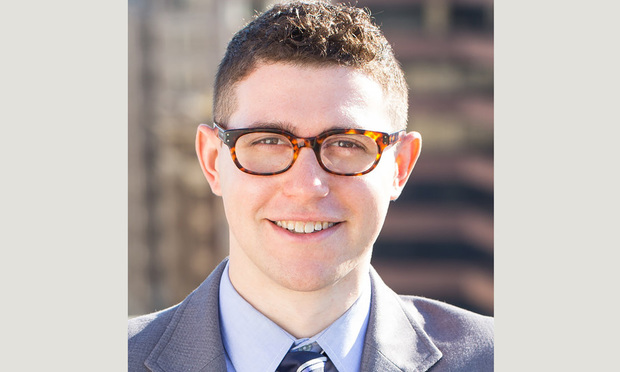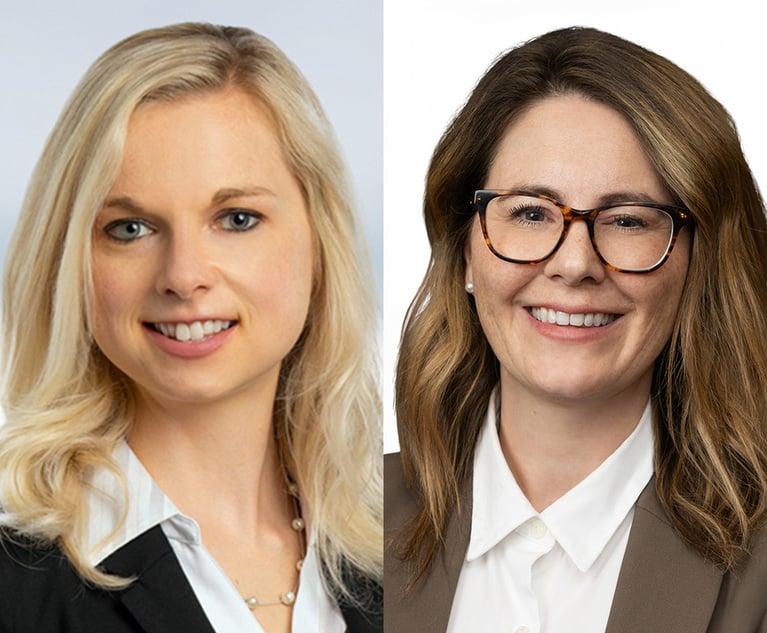Why Philadelphia Public Schools Need More State Funding
Philadelphia schools are showing signs of distress, and more state funding is a necessary part of the solution. Pennsylvania courts may soon decide that more funding is required. Here's a look at the numbers in Philadelphia underlying the problem.
December 19, 2019 at 01:37 PM
6 minute read
 Robin Lipp of Berney & Sang.
Robin Lipp of Berney & Sang.
Philadelphia schools are showing signs of distress, and more state funding is a necessary part of the solution. Pennsylvania courts may soon decide that more funding is required. Here's a look at the numbers in Philadelphia underlying the problem.
Philadelphia's public schools urgently need financial support. Almost five years into the Philadelphia School District's pursuit of "Action Plan 3.0," the district's roadmap to achieve its major goals, the district has run up against the limits of its capacity and faces new challenges in light of the poor physical state of its schools.
School buildings are crumbling, with hazards like lead and asbestos in classrooms. According to the Philadelphia Federation of Teachers, over 110,000 Philadelphia students enter buildings with lead and asbestos, and more than 88,000 students attend schools with hazardous mold.
And academic outcomes—schools' core mission—have been slow to improve. Since 2015, the overall high school graduation rate for publicly funded Philadelphia schools increased from 65% to 69% (73% to 79% among district-operated schools), remaining well below the state average of 87%. The percentage of 8-year-olds reading at grade level barely rose from 33% to 36%, a sad reflection of the landscape for Philadelphia's children.
Responses to an annual districtwide survey of Philadelphia's public school students—accessible via the district's dashboard—show many disturbing signs. Fewer than 50% of grades K-12 students say that their schools meet their learning needs all or most of the time; only 24% strongly agree with the statement, "I am learning skills in school that will help me when I am older." A full 47% say that students are treated badly at school because of their race or background.
The district has worked within state-imposed limits. For example, the district recently released a $500 million environmental improvement plan, funded by an infrastructure bond, to finance school cleanup efforts over the next five years.
Yet, despite these exertions, funding remains a major barrier to providing safe, adequate and equitable education. The $500 million bond will pay for a fraction of the district's own estimate for expenses needed to clear its deferred maintenance backlog: $4.5 billion, according to the district's FY 2019-20 budget.
To put that number in context, $4.5 billion is also the Pennsylvania Department of Education's most recent estimate of additional annual spending needed to close the "adequacy gap" between actual performance and the state's education goals on a statewide basis. A more recent estimate, in 2016, by the Public Interest Law Center places the gap-closing annual figure between $3 billion and $4.1 billion for the state, with $750 million to $1 billion needed for Philadelphia specifically (the equivalent of an additional $3,697 to $4,963 per student is necessary to achieve educational adequacy for Philadelphia students by these estimates).
Where can the city get this money? Looking at the district's budget, just over half of revenues for Philadelphia's public schools will come from the state in 2019 ($1.608 billion out of $3.136 billion), with the remainder coming mostly from local revenue sources, the largest of which is property taxation (63.8% of the district's $1.511 billion contribution to its own public schools). While the district's budget is balanced for now, the district is facing a long-term structural deficit based on projected revenues and expenses. Pressure on the district's resources will grow unless it can tap extra sources of revenue.
While Philadelphia has several possible means to increase local revenues, the city's resources and flexibility pale in comparison to the state. For example, the Office of the Philadelphia Controller estimated that completely repealing the city's 10-year tax abatement for real estate taxes on new development would have produced an additional $5.7 million in revenue earmarked for the district in 2016. While $5.7 million in additional revenue would be an important annual contribution, that amount would be a drop relative to the district's overall needs.
The state has a moral obligation to ensure that its students receive an adequate education, which requires a dramatic increase in funding levels for Philadelphia.
The state has a legal obligation, too.
Article III, Section 14 of the Pennsylvania Constitution requires the legislature to "provide for the maintenance and support of a thorough and efficient system of public education to serve the needs of the commonwealth." And the Pennsylvania Supreme Court has held that Article III, Section 32 of the Pennsylvania Constitution captures "equal protection principles" that are "substantially coterminous with the federal equal protection clause."
The Public Interest Law Center, the Education Law Center, and O'Melveny & Myers have sued several state entities on behalf of underfunded public school districts, parents of children attending underfunded schools, and the NAACP Pennsylvania State Conference. (The Pennsylvania Supreme Court decided in favor of justiciability in September 2017 and remanded to the Commonwealth Court for trial. The trial is currently set for fall 2020.) The plaintiffs' complaint seeks a declaration "that public education is a fundamental right guaranteed by the Pennsylvania Constitution to all school-age children, residing in the commonwealth," and to force the state legislature "to adopt a school financing arrangement that is reasonably calculated to ensure that all students in Pennsylvania have an opportunity to obtain an adequate education that will enable them to meet state academic standards and participate meaningfully in the economic, civic and social activities of our society."
Soon, the courts will clarify the state's legal obligations.
The future of Philadelphia's public school children depends on state action.
Robin Lipp is an associate at Berney & Sang. He joined the firm in December after serving as a judicial law clerk in the U.S. District Court for the Western District of Pennsylvania. He earned his Juris Doctor from Harvard Law School and his master's degree in public policy from the Harvard Kennedy School of Government in 2014. Contact him at [email protected].
This content has been archived. It is available through our partners, LexisNexis® and Bloomberg Law.
To view this content, please continue to their sites.
Not a Lexis Subscriber?
Subscribe Now
Not a Bloomberg Law Subscriber?
Subscribe Now
NOT FOR REPRINT
© 2025 ALM Global, LLC, All Rights Reserved. Request academic re-use from www.copyright.com. All other uses, submit a request to [email protected]. For more information visit Asset & Logo Licensing.
You Might Like
View All
De-Mystifying the Ethics of the Attorney Transition Process, Part 2

Embracing a ‘Stronger Together’ Mentality: Collaboration Best Practices for Attorneys
6 minute read
US Supreme Court Considers Further Narrowing of Federal Fraud Statutes
4 minute readTrending Stories
- 1Securities Action Targeting Polestar Alleges Mistakes in SEC Filings
- 2Conspiracy Suits Against Quinn Emanuel, Roc Nation Moved to Federal District Court
- 3'Knowledge of Mismatch:' Fed Judge Offers Guidance on How to Hold Banks Accountable for Erroneous Transfers
- 4PAGA Claims Must Now Be 'Headed'
- 5Million-Dollar Verdict: Broward Jury Sides With Small Business
Who Got The Work
J. Brugh Lower of Gibbons has entered an appearance for industrial equipment supplier Devco Corporation in a pending trademark infringement lawsuit. The suit, accusing the defendant of selling knock-off Graco products, was filed Dec. 18 in New Jersey District Court by Rivkin Radler on behalf of Graco Inc. and Graco Minnesota. The case, assigned to U.S. District Judge Zahid N. Quraishi, is 3:24-cv-11294, Graco Inc. et al v. Devco Corporation.
Who Got The Work
Rebecca Maller-Stein and Kent A. Yalowitz of Arnold & Porter Kaye Scholer have entered their appearances for Hanaco Venture Capital and its executives, Lior Prosor and David Frankel, in a pending securities lawsuit. The action, filed on Dec. 24 in New York Southern District Court by Zell, Aron & Co. on behalf of Goldeneye Advisors, accuses the defendants of negligently and fraudulently managing the plaintiff's $1 million investment. The case, assigned to U.S. District Judge Vernon S. Broderick, is 1:24-cv-09918, Goldeneye Advisors, LLC v. Hanaco Venture Capital, Ltd. et al.
Who Got The Work
Attorneys from A&O Shearman has stepped in as defense counsel for Toronto-Dominion Bank and other defendants in a pending securities class action. The suit, filed Dec. 11 in New York Southern District Court by Bleichmar Fonti & Auld, accuses the defendants of concealing the bank's 'pervasive' deficiencies in regards to its compliance with the Bank Secrecy Act and the quality of its anti-money laundering controls. The case, assigned to U.S. District Judge Arun Subramanian, is 1:24-cv-09445, Gonzalez v. The Toronto-Dominion Bank et al.
Who Got The Work
Crown Castle International, a Pennsylvania company providing shared communications infrastructure, has turned to Luke D. Wolf of Gordon Rees Scully Mansukhani to fend off a pending breach-of-contract lawsuit. The court action, filed Nov. 25 in Michigan Eastern District Court by Hooper Hathaway PC on behalf of The Town Residences LLC, accuses Crown Castle of failing to transfer approximately $30,000 in utility payments from T-Mobile in breach of a roof-top lease and assignment agreement. The case, assigned to U.S. District Judge Susan K. Declercq, is 2:24-cv-13131, The Town Residences LLC v. T-Mobile US, Inc. et al.
Who Got The Work
Wilfred P. Coronato and Daniel M. Schwartz of McCarter & English have stepped in as defense counsel to Electrolux Home Products Inc. in a pending product liability lawsuit. The court action, filed Nov. 26 in New York Eastern District Court by Poulos Lopiccolo PC and Nagel Rice LLP on behalf of David Stern, alleges that the defendant's refrigerators’ drawers and shelving repeatedly break and fall apart within months after purchase. The case, assigned to U.S. District Judge Joan M. Azrack, is 2:24-cv-08204, Stern v. Electrolux Home Products, Inc.
Featured Firms
Law Offices of Gary Martin Hays & Associates, P.C.
(470) 294-1674
Law Offices of Mark E. Salomone
(857) 444-6468
Smith & Hassler
(713) 739-1250






